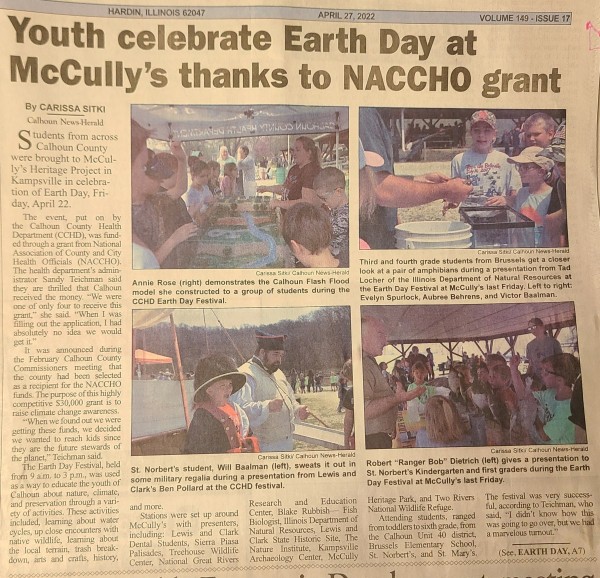The National Association of County and City Health Officials, with support from the Climate and Health Program at the Centers for Disease Control and Prevention (CDC), awarded Calhoun County Health Department in Illinois with $25,000 to supplement ongoing climate change and health adaptation initiatives at the local level.
The Project
Flooding is a natural disaster that most people will experience at some point in their life. Unfortunately for Calhoun county residents, that’s something we face on a yearly basis and has become the new norm. Our program is aimed to shed a light on flooding and not only educate our residents, but show how flooding negatively impacts our area.
The Challenge
When an area floods, it impacts the community as a whole. Homes and businesses are damaged or lost, and sometimes even loss of life occurs. Most often, however, we see the elderly, minorities and lower-income people impacted the worst because these populations are least likely to have transportation if an evacuation was to occur. They often don’t even have the ability to relocate, and they are least likely to have flood insurance. In Calhoun County, we live in a rural and isolated area where resources are limited. Our population is small, our poverty rate is 9.2%, and we have a predominantly older population. In order to keep our community safe and thriving, our community needs to take preventative actions to help decrease the negative impacts flooding has on our area. We also need to plan in advance how to prepare our area for yearly flooding and know what to do during a flood to keep our community safe.
Addressing the Problem
The Calhoun County Health Departments environmental staff were the ones who developed and led the program. Our goal was to reach out to our Calhoun county residents and educate them on how climate change impacts our area. We educated our youth by hosting our 1st annual Earth Day event. The development of our interactive model demonstrated a frequent natural disaster that we see here in Illinois, flash flooding. When you grow up living in Calhoun, you play in creeks your whole life. We were able to provide kids with safety tips and informed them how fast flash floods occur and how dangerous they can be. We also educated our residents on how climate change can impact factors that could lead to an increase in flooding, especially in our area. We created flood packets that went into the history of Calhoun flooding and also discussed what to do before, during, and after a flood. We were able to create new relationships within the community and strengthen the ones that we already had. Hopefully, as we expand our program through the years, these partners will expand with us.
The Outcome
Even though this program was a huge success, there is still a lot of work that will need to be done. Discussing climate change in our community is a tricky subject since people in our area are set in their ways when it comes to climate change. They either don’t believe in it or they don’t think that our area is impacted by climate change. We successfully met our two short term goals. Our first goal was to educate our youth and the second goal was to reach out to our residents and get the conversation started.
Continuous education with our youth and residents is our long term goal, as well as working with our community partners as we try to expand this program. Our staff loves this topic and is already planning for future endeavors. As long as we continue to provide quality events and education, the public will stay interested.
Lessons Learned
One of the most important things that we learned from creating this program is that younger generations are able to handle complex topics. When we hosted Earth Day, our main concern was the ages participating. We included a wide age range and we assumed the younger ones wouldn’t be able to comprehend a complicated topic like flash flooding, but we were wrong. We will say the pre-k students were too young, but they still liked watching the water run through the model and see the houses and cars float away. The rest of the age groups asked some really great questions and came up with even better answers to my questions. We had parents of 1st and 2nd graders come up to us a week after the event and tell us that their child enjoyed the event and loved the flash flood model, and this happened more than once. So, we were right to open up the flash flooding topic to all age groups at the event because even if they didn’t remember everything we talked with them about, they were able to remember something and bring it home to their family and get an important conversation started at home.
Contact Information
Anne Rose
Calhoun County Health Department, IL
[email protected]







